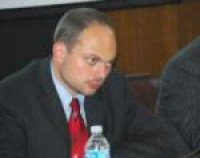https://www.the-american-inter...
By Vladimir Kara-Murza
It’s been five years since Boris Nemtsov was gunned down in front of the Kremlin. His legacy will survive Putin’s attempts to destroy it.
On the last weekend of February, more than 20,000 people marched in downtown Moscow to mark the fifth anniversary of the murder of Boris Nemtsov, Russia’s former deputy prime minister and Vladimir Putin’s most prominent opponent. Chanting “Russia will be free” and “murderer out of the Kremlin,” demonstrators walked down the same path Nemtsov took for his last-ever march against Putin’s war on Ukraine in September 2014. The mood was somber but defiant, and the rally drew activists across the political spectrum: People who may not share much in ideology but believe in the right to voice one’s opinions free from intimidation, imprisonment—or murder. Nemtsov was one of the few leaders in Russia’s notoriously fragmented opposition who was able to bring squabbling factions to the table. He continues to do so, even in death.
The vigil was national; commemorative events marking the anniversary were held across Russia. In some places, including St. Petersburg and Novosibirsk, the authorities tried to prevent the rallies from going ahead by initially denying permits, but perseverance from local organizers, and a realization that people would go anyway, forced them to compromise.
The Kremlin marked the anniversary in its own way. On February 27, five years to the day Nemtsov was gunned down on a bridge in front of the Kremlin, Putin awarded the Order of Merit for the Motherland to Suleiman Geremeyev, a senator from Chechnya and the uncle of Ruslan Geremeyev, a suspected co-organizer of Nemtsov’s murder who was sanctioned last year by the U.S. government over his role in the crime. The keys to Senator Geremeyev’s hotel room were found in the apartment where the now-convicted gunmen had been staying. Lawyers for the Nemtsov family requested that he be questioned as part of the investigation, but just as with other high-ranking persons of interest—including Chechen leader Ramzan Kadyrov and Putin’s longtime security chief General Viktor Zolotov—the request was denied. Officially Geremeyev was decorated for his “legislative efforts.” According to the Russian parliament’s database, since 2015 he has not sponsored a single bill.
The impunity of the organizers and masterminds of Nemtsov’s murder was the focus of a long-awaited report delivered last month in Vienna by Margareta Cederfelt, vice president and special rapporteur of the Parliamentary Assembly of the Organization for Security and Cooperation in Europe (OSCE). The 43-page document details various ways in which Russian authorities stonewalled the investigation and ensured that it did not go beyond the immediate perpetrators—including by preventing discussion of motive, refusing to release key evidence, and protecting high-level masterminds.
The OSCE’s conclusion was clear-cut: “[T]he main issue for addressing impunity is not the capabilities of Russian law enforcement, but political will.” In other words, it is not that Russian investigators are unable to find those culpable, it is that Russian authorities are not letting them. On two occasions, investigators tried to indict the junior Geremeyev in absentia for his role in the murder; both times, they were blocked on the personal orders of General Alexander Bastrykin, Putin’s university friend who now heads the Russian Investigative Committee.
One particular line of inquiry may explain such high-level interest. The OSCE report quotes extensively from the sworn testimony of Akhmed Zakayev, a former deputy prime minister of Chechnya whose sources in Kadyrov’s entourage had told him that Putin personally ordered the killing of Nemtsov while in Chechnya in December 2011. Vadim Prokhorov, a lawyer for the Nemtsov family, delivered Zakayev’s testimony to the Investigative Committee. Unsurprisingly, not even a formal probe was initiated.
What was surprising—revealing, even—was the response Cederfelt received from Russian authorities to her request for cooperation. Through an embassy cable, Russia’s foreign ministry informed the OSCE rapporteur that she will not get access to the case files on the Nemtsov murder because they contain information protected by the law “On State Secrets.” “There can only be one state secret here: the mastermind either lives in the Kremlin or visits there regularly,” tweeted Mikhail Khodorkovsky, the exiled former oil magnate and Putin opponent.
International involvement is important not only for scrutinizing the Kremlin’s ongoing cover-up in the investigation, but also for countering its continuing attempts to erase the memory of Russia’s opposition leader. Last month, Prague became the fourth world capital—after Washington, Vilnius, and Kyiv—to designate a square for Boris Nemtsov in front of the Russian embassy. “Together we honor our collective Czech tradition of humanitarian justice,” Prague Mayor Zdeněk Hřib said as he unveiled the new plaque. “Boris Nemtsov Square is also a reminder that human rights can’t be taken for granted . . . and that we must continuously work for them.”
One day, there will be a Nemtsov Square in Moscow—and the OSCE recommendation for “a new and full investigation into the assassination of Boris Nemtsov, clarifying what took place . . . and on whose orders” will be carried out by a Russian government interested in serving justice, not protecting the murderers. No one can say when that day will come. But the thousands of Russians who went to the streets last month are helping to bring that day a little closer.
Vladimir Kara-Murza, a Russian democracy activist and a longtime colleague of Boris Nemtsov, is chairman of the Boris Nemtsov Foundation for Freedom.
Russia’s Battle for Memory and Justice
Rahvusvahelised uudised | 10 Mar 2020 | EWR
Rahvusvahelised uudised
TRENDING

























